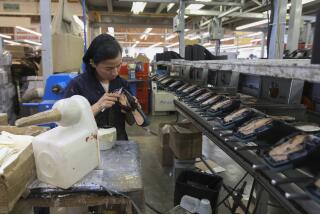Mexico Opens Its Borders to World Computer Imports : Trade: Eliminating permits and adding domestic tax incentives should triple the countryâs computer market.
MEXICO CITY â Mexico has opened its computer market--one of its few remaining protected industries--to imports in a move that could further stimulate that fast-growing industry.
Commerce Secretary Jaime Serra Puche said this week in a brief announcement that Mexico will no longer require permits for computer imports. A tariff will be charged, but he did not specify the amount. The maximum Mexican import tariff now is 20%.
The market opening, combined with simultaneously announced unspecified tax incentives for domestic producers, could help the Mexican computer market reach $3 billion by 1993, said Federico Ruiz Sacristan, president of Mexicoâs National Electronics Industry Chamber. That would be triple the current market.
The immediate effect of trade liberalization will be a flood of low-priced imports into Mexico, predicted Nora Mosqueda, sales manager for CIGE, a distributor of Mexican-made Hewlett-Packard and International Business Machines computers.
However, Mosqueda said she expects no negative effects from the new competition.
Companies already established in the Mexican market had anticipated the import policy change and have been dropping their prices over the past year to international levels as they introduced new products.
For example, Mosqueda said, the old Hewlett-Packard LaserJet II printer sold for $3,450. The improved LaserJet III has a $3,020 price tag.
Most major U.S. companies, including Apple Computer and Unisys, have Mexican operations concentrated in the Guadalajara region. The new policy will allow those companies to import additional products not now available in Mexico.
Mexico has carefully cultivated its computer industry, leaving computer products among the 3% of imports protected by permits.
Foreign and domestic investment in the Mexican computer industry grew from $29 million in 1983 to $84 million in 1988, the last year for which figures are available. Exports of Mexican computer products grew from nothing in 1978 to $175 million a decade later.
The new policy is aimed at encouraging further exports, Serra Puche said.
âIncentives will be given to companies based on the domestic content of their products, their net investment in domestic assets and their expenditures on research and development,â he said.
Trade liberalization combined with tax incentives will allow the entire country to take advantage of the best technology from all over the world while encouraging the domestic computer industry to find its place in the international market, he said.
More to Read
Sign up for Essential California
The most important California stories and recommendations in your inbox every morning.
You may occasionally receive promotional content from the Los Angeles Times.









